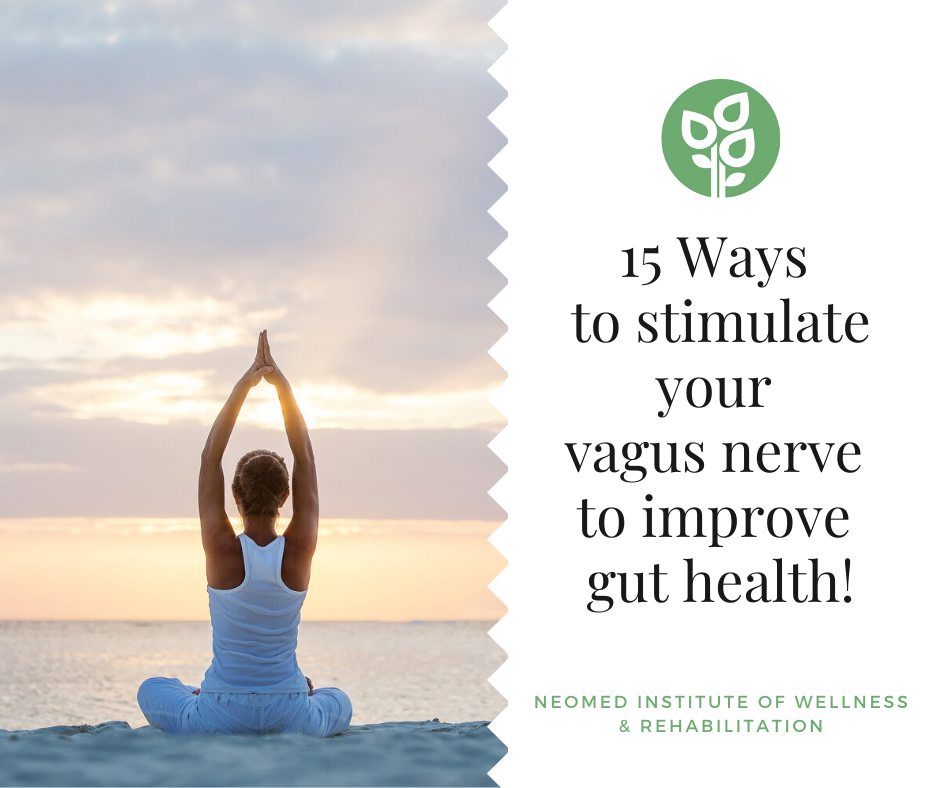15 Ways to Stimulate Your Vagus Nerve to Improve Gut Health
The health of our gut, and how it impacts other areas of our health such as our immune and mental health, is currently the subject of much exciting research. The more researchers learn about the way the brain is linked to the gut, via the ‘brain-gut axis’, the more is understood about the vagus nerve and how it too can influence our health.
The vagus nerve forms a major part of the parasympathetic, or rest and digest, nervous system. Our article on Paying Attention to Your Vagus Nerve goes into more detail about the role of the vagus nerve, and how it can impact the rest of the body. In particular, if the vagus nerve loses tone, how it can negatively affect our overall health and lead to chronic disease.
But the good news is, there are ways that we can stimulate the vagus nerve to improve its tone, and in turn, improve our gut-brain communication and consequently, our overall health. Here’s how…

1. Yoga
Practising mild exercise such as yoga stimulates the vagus nerve and in doing so, stimulates the smooth muscle that lines the gut. When this muscle contracts, it pushes food along the entire digestive tract, encouraging healthy digestion.
2. Deep breathing exercise
One of the most effective ways to stimulate your vagus nerve is to practice meditative, deep breathing exercises. The idea is to breathe out for a few seconds longer than you breathe in. In doing so, the vagus nerve is stimulated into switching on the parasympathetic nervous system, hence promoting calmness and relaxation.
Breathe in for two counts and hold for one count, then breathe out for four counts and hold for one count. Practice this several times daily.
3. Singing
Singing causes vibrations that stimulate the vagus nerve, essentially giving it a workout. Even if you don’t have a great singing voice, sing when you’re at home alone (or with an understanding partner) and notice how much of a relaxing pastime it is.
Singing to activate the vagus nerve de-stresses us, moving us out of the sympathetic (fight or flight) nervous system, switching on the parasympathetic (rest and digest) nervous system.
4. Acupuncture
It’s thought that acupuncture, when carried out by a properly licensed practitioner, can stimulate the vagus nerve.

5. Laugh lots!
In the same way that singing stimulates the vagus nerve, laughing can also make us feel less stressed, and more at peace. It’s thought that laughter can activate the vagus nerve, due to the occasional unexpected side effects of laughter including urination, coughing and defecation, all of which are stimulated by the activation of the vagus nerve.
6. Eat more plants
Eating large amounts of eggs and red meat can mean that you’re also consuming large amounts of the micronutrient choline. Choline is an essential nutrient, required for healthy cells and the production of the neurotransmitter, acetylcholine which aids in brain function.
But too much choline can lead to a build-up of an inflammatory compound called TMAO which is linked to heart disease. Cutting out animal products can help the vagus nerve to better regulate heart rate and blood pressure.
7. Cut down on sugar
Excess dietary sugar can lead to increased levels of inflammatory markers in the digestive tract and can interfere with the communication pathways between the gut and the brain.

8. Sleep on your right-hand side
Sleeping on your right-hand side is thought to stimulate the vagus nerve, more so than sleeping on your left or on your back
9. Eat more fibre
Drinking plenty of water and herbal teas (so that your urine is a pale straw colour) and eating fibre rich foods such as wholegrain cereals, wholewheat pasta and bread, broccoli, skin-on potatoes, peas, beans and fruits will help to keep your bowel regular.
A regular bowel will help to keep your gut free from lingering digested food which can lead to inflammation and bad bacteria that can interfere with the brain-gut axis.
10. Gargling
The muscles we use to gargle water are stimulated by the vagus nerve. The theory is, that gargling will help to work the muscles that are connected to the vagus nerve, and in doing so, will give the vagus nerve a workout.
11. Cold exposure
When we’re exposed to the cold, our fight or flight sympathetic nervous system gets suppressed, switching on our rest and digest the parasympathetic nervous system. Spending time feeling cold (at temperatures ideally at 10°C or lower) will help to stimulate the vagus nerve.
Some people do this by standing under a cold shower, but this takes some practice. To begin with, try splashing your face with cold water.
12. Pulsed Electromagnetic Field Therapy (PEMF) and Heart Rate Variability (HRV)
There is research emerging that PEMF devices can help to stimulate the vagus nerve and heart rate variability, in particular, it helps to influence the autonomic nervous system, which helps to control the fight or flight response, meaning that it promotes a more calming influence on the body.
HRV, or the time interval between heartbeats, is influenced by the autonomic nervous system. The more regular, the better – a loss of frequency of HRV can result in cardiovascular disease. Stimulating the vagus nerve can in turn therefore influence HRV meaning that for example, after exercise, the time taken to recover to a normal HRV is reduced.
13. Take lion’s mane mushroom
A type of medicinal mushroom that’s been used for its healing properties for centuries in ancient medicine practices, lion’s mane mushroom can stimulate nerve growth and help to protect the health of the nerves, including the vagus nerve.
It also helps to support gut health by helping to repair and protect the gut lining.

14. Fill up on beetroot juice and omega 3
Studies show that compounds within beetroot juice are capable of influencing the effects of the vagus nerve on HRV, decreasing blood pressure and the oxygen demands of the heart during exercise.
Other studies show that omega 3 fatty acids (from foods such as oily fish and walnuts) also have the same effect, lowering blood pressure and increasing the HRV.
15. Take probiotic supplements
Probiotics, in particular, Bifidobacterium longum and Lactobacillus rhamnosus can also stimulate the vagus nerve, leading to better gut health. Probiotics help to support a healthy gut microbiota (the collection of good bacteria that reside in our guts) and gut health.
Evidence is emerging that B.longum can activate the vagus nerve to help reduce anxiety-like behaviour. There’s also evidence that L.rhamnosus also influences the vagus nerve and the gut-brain axis to help manage anxiety and depression.
Try any one or a combination of these vagus nerve stimulation exercises, and you could improve your brain-gut communication and your overall health.







